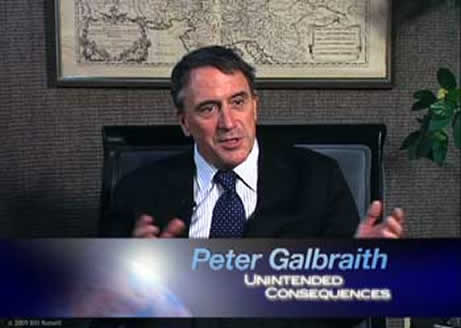 |
Peter Galbraith... diplomat and author. The first U.S. Ambassador to Croatia, Mr. Galbraith’s best-seller The End of Iraq is a first-hand account of Bush Administration “arrogance and ignorance” in foreign policy, particularly in Iraq. His Unintended Consequences: How War in Iraq Strengthened America’s Enemies looks ahead. Mr. Galbraith spent almost 25 years in government service starting as professional staff to the Senate Foreign Relations Committee. He is currently the Senior Diplomatic Fellow at the Center for Arms Control and Non-Proliferation and a regular contributor to The New York Review of Books. |
George W. Bush lost the War in Iraq. Hold him responsible for weakening the United States and strengthening its enemies, with devastating unintended consequences, says former U.S. Ambassador Peter Galbraith. After eight years of failed foreign policy, this veteran diplomat points the U.S. toward an effective, pragmatic national security strategy.
“We've had an administration that has substituted optimism, ideology and wishes, for looking at the world as it is, for devising a strategy that involves rationing scarce national security resources to accomplish American goals. (Bush) increased the danger of rogue countries having nuclear weapons. (His Administration) weakened democratic regimes. They set back the process of reform.
“Who's controlling (Iran, Pakistan and North Korea) nuclear weapons and that nuclear technology? This ought to be the focus, and this is what we've neglected. What has the Bush administration done? Nothing. It's had tough rhetoric unmatched by any action.
An honest assessment of the present is essential, Ambassador Galbraith insists.
“First, the Iraq war is lost. Success has to be measured against our objectives, defined by President Bush as a democratic, unified and stable Iraq. We can hardly look back after all the money we've spent, all the sacrifices we've made, and say we've had success when we end up with the very same people in power six years later.”
“Second, the responsibility belongs to George W. Bush: the fact of the Iraq War, how he conducted it and how he conducted the occupation. He (was) the president, this (was) his administration. He's not knowledgeable, he’s incurious, and he allowed others to make -- or not make -- decisions that he ought to have made, but I think it's wrong to characterize him as stupid. He's been a very weak man. He never decided anything.”
Looking ahead, Ambassador Galbraith’s pragmatism calls for the United States to make the most efficient use of the all the instruments of statecraft at our command.
“Let me just cite one example that's gone out of fashion. Negotiation. President Bush went to Israel to denounce Obama's idea of negotiating with Iran. There was nothing wrong with Chamberlain negotiating with Hitler. If (Chamberlain) had been as tough a negotiator as we were in the Balkans in the ‘90s, World War II might have been avoided. Clearly, some bargain with Iran, if it can be achieved, would leave us better off than where we are now.
“Sit down and say ‘What are the greatest dangers to our security? What are the resources that we have available?’ Apply the most resources to the greatest threats or the biggest opportunities. We need to get out of Iraq so that we free up the military resources, and so that we can focus the attention on the places that are real threats to the U.S.,” Ambassador Galbraith says.
While crises always take us by surprise, he urges the U.S. to learn in the next 20 years from the past twenty -- ethnic nationalism and separatism have been at the heart of all but one of the conflicts in which we’ve been involved.
“The overriding goal should be stability and avoiding violence, not a reflexive commitment to the preservation of existing countries. We should be more flexible. That is my point. The test of our national security strategy has to be effectiveness and this administration has been ineffective.”
[This Program was recorded November 11, 2008, in Atlanta, Georgia, U.S.]
audio content:
Conversation 1 |
Conversation 2 |
Conversation 3 |
Conversation 4 |
Conversation 5 |
Conversation 6 |
 8:55 8:55 |
 11:32 11:32 |
 13:07 13:07 |
 10:20 10:20 |
 6:42 6:42 |
 9:54 9:54 |
 |
 |
 |
 |
 |
 |


